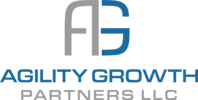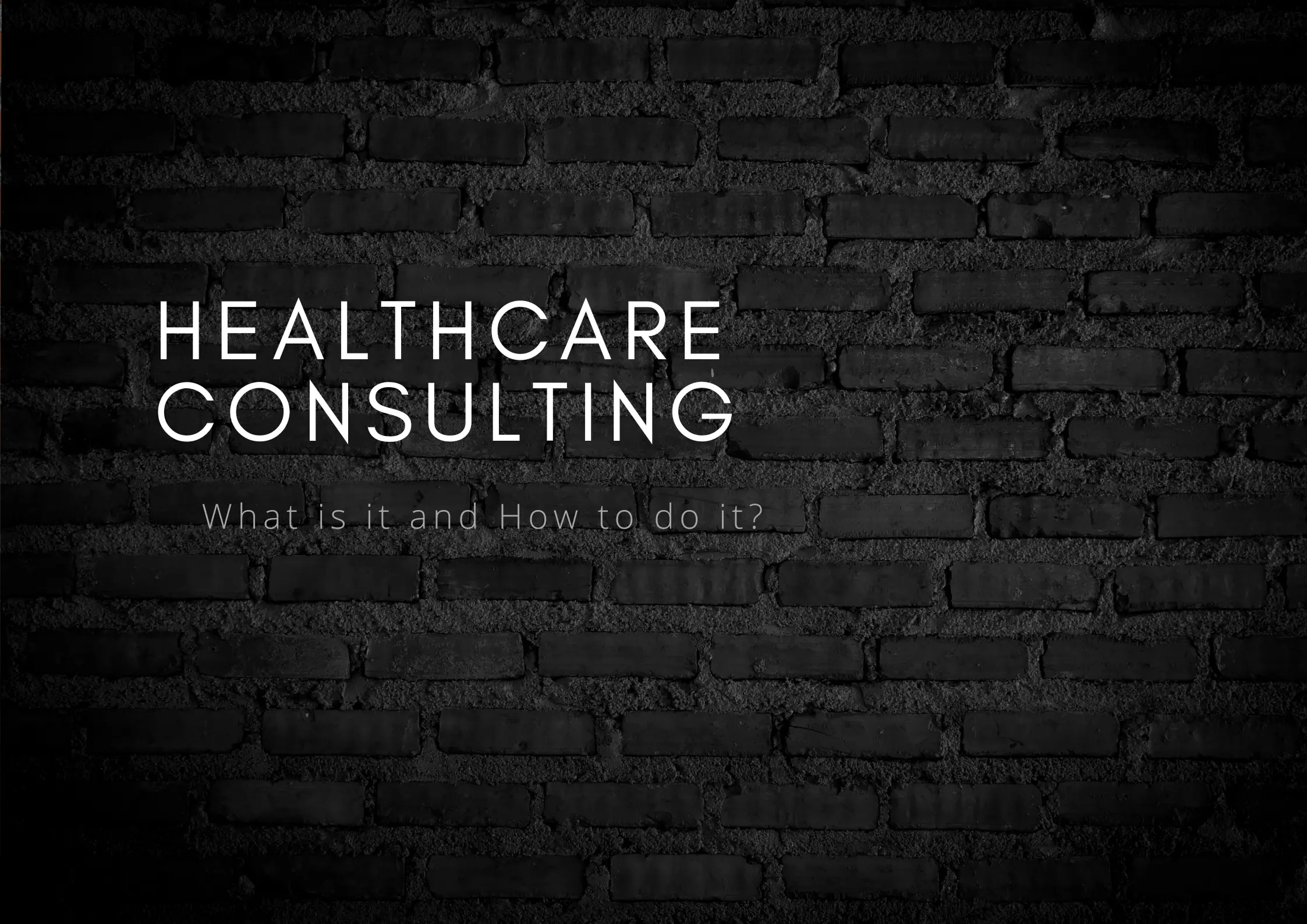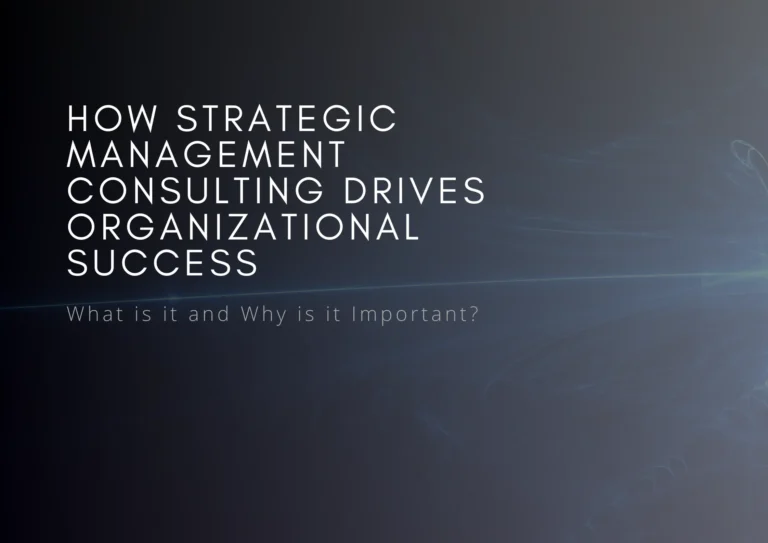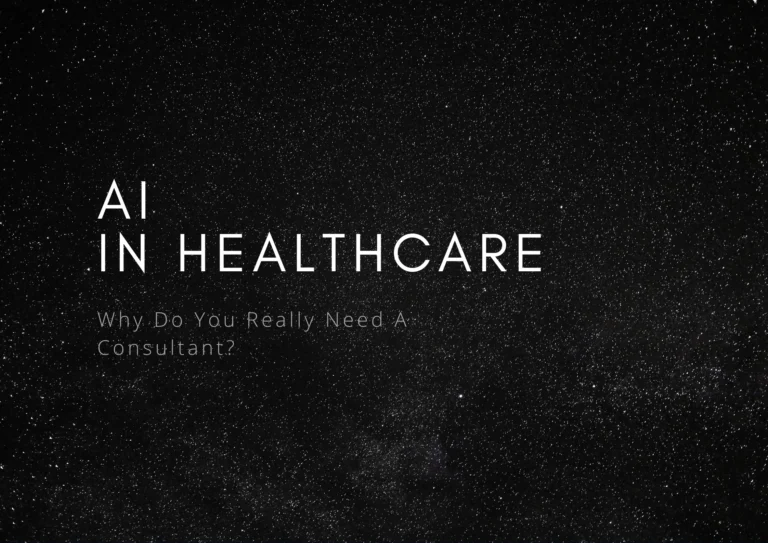Healthcare consulting has become a critical component in navigating the complexities of the healthcare industry. From strategy and management to technology integration and quality improvement, healthcare consultants provide valuable expertise to enhance operational efficiency, improve patient outcomes, and drive sustainable growth.
This article explores the essential aspects of healthcare consulting, including emerging trends and actionable insights, to help organizations achieve their goals.
What is Healthcare Consulting?
Healthcare consulting is a specialized field focused on delivering strategic advice, operational expertise, and technical solutions to healthcare organizations. As the healthcare consulting industry grows—valued at over $33 billion and projected to expand by 15% by 2026—the need for skilled consultants has never been greater. From navigating regulatory frameworks to leveraging cutting-edge technologies, healthcare consultants enable organizations to address challenges and seize opportunities in a competitive market.
Benefits of Healthcare Consulting
Healthcare consulting offers transformative benefits that empower organizations to navigate complex challenges, improve performance, and deliver superior care. By partnering with healthcare consultants, organizations gain access to specialized expertise and innovative solutions tailored to their unique needs. Below, we explore the key advantages of healthcare consulting.
1. Improved Patient Outcomes
The ultimate goal of healthcare is to deliver high-quality care that improves patient health and satisfaction. Healthcare consultants drive this mission by:
- Implementing Data-Driven Strategies: Using advanced analytics and performance metrics, consultants identify gaps in care delivery and develop actionable plans to address them.
- Reducing Medical Errors: Consultants guide organizations in adopting evidence-based practices and technologies such as clinical decision support systems, which minimize the risk of errors.
- Optimizing Care Models: By redesigning care delivery frameworks, consultants ensure that patients receive timely and appropriate care, resulting in better health outcomes and higher satisfaction rates.
2. Increased Operational Efficiency
Operational inefficiencies drain resources and hinder organizational success. Healthcare consultants help organizations achieve peak efficiency by:
- Streamlining Workflows: Consultants analyze existing processes to identify bottlenecks and implement lean methodologies that optimize operations.
- Redesigning Processes: By reengineering workflows, consultants enable seamless coordination between departments, improving service delivery.
- Deploying Performance Improvement Strategies: Leveraging tools like Six Sigma and Kaizen, consultants ensure continuous improvement in operational performance.
- Optimizing Resource Allocation: Consultants assist in ensuring the right staff, equipment, and facilities are utilized effectively, reducing waste and maximizing productivity.
3. Enhanced Financial Performance
Financial sustainability is critical for healthcare organizations. Consultants contribute to this goal by addressing financial challenges and identifying opportunities for growth:
- Revenue Cycle Management: Consultants refine billing and coding processes to increase accuracy, reduce denials, and improve cash flow.
- Cost-Containment Measures: Identifying and eliminating unnecessary expenses ensures better cost control without compromising care quality.
- Reimbursement Optimization: Consultants guide organizations through complex reimbursement models, including value-based care, to maximize revenue potential.
- Strategic Financial Planning: Consultants help organizations forecast future financial needs and develop strategies for sustainable growth.
4. Access to Specialized Expertise
The healthcare industry is highly regulated and technologically complex, requiring in-depth knowledge and experience to navigate successfully. Healthcare consultants provide:
Tailored Solutions: With specialized knowledge in areas like population health, chronic disease management, and healthcare equity, consultants design programs that address unique organizational challenges.
Regulatory Compliance Guidance: Staying compliant with regulations like HIPAA, GDPR, and CMS rules is crucial. Consultants ensure organizations meet these requirements effectively.
Technology Integration Expertise: From implementing EHR systems to adopting AI and telehealth platforms, consultants bring the expertise needed to embrace cutting-edge technologies.
Industry Insights: Consultants offer a deep understanding of market trends, helping organizations anticipate changes and adapt strategically.
Key Healthcare Consulting Services
Healthcare consulting services are designed to address the multifaceted challenges faced by healthcare organizations. From strategy and operations to technology and population health, consultants provide expertise that enables organizations to enhance care delivery, improve efficiency, and achieve financial sustainability. Below is a deeper exploration of these core services.
1. Healthcare Strategy
Healthcare consultants are instrumental in guiding organizations to develop and execute long-term strategic plans. Their expertise ensures that organizations remain competitive and responsive to industry shifts.
- Setting Long-Term Goals: Consultants assist in defining actionable objectives aligned with the organization’s mission, vision, and values.
- Competitive Strategies: By analyzing market trends, competitors, and internal capabilities, consultants help organizations carve out a unique position in the market.
- Adapting to Industry Trends: From value-based care models to consumer-driven healthcare, consultants ensure that organizations are well-positioned to capitalize on emerging opportunities.
2. Operations Improvement
Operational efficiency is vital for delivering quality care while controlling costs. Healthcare consultants optimize processes and improve overall organizational performance by:
- Streamlining Operations: Consultants identify inefficiencies in workflows and redesign processes to reduce waste and enhance coordination.
- Improving Staff Productivity: By analyzing staffing models and workload distribution, consultants propose solutions to optimize workforce utilization.
- Implementing Best Practices: Leveraging industry benchmarks and proven methodologies, consultants ensure that operations align with high-performing healthcare systems.
3. Technology Implementation
Healthcare technology is at the forefront of modern care delivery, and consultants play a pivotal role in integrating these advancements into organizational practices.
- Adopting Digital Health Solutions: Consultants guide organizations in selecting and implementing tools like patient portals, telehealth systems, and mobile health apps.
- Electronic Health Records (EHR): Consultants ensure the successful integration of EHR systems, enhancing interoperability and streamlining documentation processes.
- Telehealth Platforms: Consultants help establish virtual care models, enabling organizations to expand access and meet growing demand for remote care.
- AI-Driven Tools: From predictive analytics to automated decision support systems, consultants facilitate the adoption of AI technologies to improve outcomes and efficiency.
4. Revenue Cycle Management (RCM)
Revenue cycle management ensures the financial health of healthcare organizations. Consultants provide targeted expertise to optimize revenue generation and cash flow.
- Optimizing Coding and Billing: Accurate coding and streamlined billing practices reduce claim denials and improve payment turnaround times.
- Payer Negotiations: Consultants assist in renegotiating payer contracts to secure favorable reimbursement rates and terms.
- RCM Analytics: By leveraging data, consultants identify bottlenecks in the revenue cycle and implement solutions to improve overall performance.
- Value-Based Payment Models: Consultants guide organizations in transitioning to alternative payment models, such as bundled payments and shared savings arrangements.
5. Population Health Management
Population health management focuses on improving outcomes for defined patient groups by addressing health disparities and promoting preventive care.
Community Health Outcomes: Working with public health officials and community organizations, consultants create initiatives to improve overall community health and well-being.
Data Analytics: Consultants use advanced analytics to identify trends, assess risks, and target interventions for specific populations.
Reducing Health Disparities: By developing strategies that address social determinants of health, consultants help improve equity in healthcare delivery.
Chronic Disease Burden: Consultants design coordinated care programs and lifestyle intervention strategies to prevent and manage chronic conditions like diabetes, hypertension, and heart disease.
Related Consulting Specialties: Innovation and New Product Development
In addition to healthcare consulting, several specialized consulting fields focus on innovation and product development within the healthcare and life sciences sectors:
- Life Sciences Consulting: This specialty involves strategy and operations consulting for a variety of clients, including medical providers, pharmaceutical companies, biotech firms, insurance providers, and other healthcare-related organizations. The focus is on optimizing operations, developing strategic growth plans, and improving patient and organizational outcomes.
- Biotech Consulting: Biotech consulting is centered on products derived from biology-based research, distinguishing it from broader areas that include chemistry, environmental sciences, and behavioral studies. Biotech consultants work with large pharmaceutical companies and smaller biotech firms, often in areas like medicine, energy, or agriculture, to bring innovative products to market and navigate regulatory complexities.
Strategy and Management in Healthcare Consulting
Developing Long-Term Goals and Plans
Healthcare consultants assist organizations in defining clear, actionable, and measurable long-term goals. This involves conducting market strategy & research, analyzing competitive landscapes, and developing strategic roadmaps tailored to the organization’s vision and mission.
Operational Efficiency and Workforce Management
Operational inefficiencies and workforce challenges are common pain points in healthcare. Consultants implement process improvements, optimize resource allocation, and design workforce management strategies to enhance productivity while maintaining high-quality care standards.
Enhancing Leadership and Governance
Strong leadership is vital for organizational success. Healthcare consultants provide executive coaching, leadership training, and governance frameworks to foster decision-making excellence and strategic alignment across teams.
Financial Consulting in Healthcare
Revenue Cycle Management
Effective revenue cycle management (RCM) is critical to sustaining financial health. Consultants streamline billing processes, improve claim accuracy, and enhance payer negotiations to maximize reimbursements.
Budgeting and Cost Containment
Cost containment strategies are essential to improving margins without compromising quality. Consultants perform financial audits, identify cost-saving opportunities, and implement budgeting systems to ensure fiscal responsibility.
Navigating Reimbursements and Payer Relationships
Consultants guide healthcare organizations through the complexities of payer relationships and reimbursement models, including fee-for-service, value-based care, and alternative payment systems.
Technology and Innovation in Healthcare Consulting
Digital Health Solutions
Digital health is revolutionizing care delivery. Consultants enable organizations to adopt and scale electronic health records (EHR), patient portals, and mobile health applications to improve access and engagement.
Telehealth, Virtual Care, and AI Integration
The rise of telemedicine and virtual care has transformed patient interactions. Consultants integrate AI-powered diagnostic tools, predictive analytics, and telehealth platforms to enhance care efficiency and outcomes.
Data Analytics, Cloud Computing, and Cybersecurity
Data is a cornerstone of modern healthcare. Consultants specialize in implementing data analytics solutions, migrating to secure cloud infrastructures, and ensuring compliance with cybersecurity standards to protect sensitive patient information.
Related Articles: Digital Growth Consulting – Why ,How, When?
Improving Healthcare Quality and Compliance
Accreditation and Certification Support
Accreditation and certifications from organizations like The Joint Commission or ISO signify quality and safety. Consultants help healthcare providers prepare for these evaluations, ensuring adherence to standards.
Ensuring Regulatory Compliance
Healthcare consultants ensure that organizations meet local, national, and international regulations, including HIPAA, GDPR, and other industry-specific guidelines.
Patient Safety and Risk Management
Minimizing risks is crucial for patient safety. Consultants design and implement risk management strategies to identify potential vulnerabilities and reduce medical errors.
Case Studies: Real-World Impact
Case Study 1: Enhancing Patient Experience
A mid-sized hospital partnered with a consulting firm to redesign its patient intake process. By implementing streamlined workflows and digital check-in systems, the hospital reduced wait times by 40% and increased patient satisfaction scores by 25%.
Case Study 2: Cost Reduction through Efficiency
A long-term care facility achieved $2 million in annual savings after consultants restructured its staffing model and integrated automated medication management systems.
Case Study 3: Revenue Growth
A healthcare system facing declining reimbursements leveraged consulting expertise to improve billing accuracy and claim submissions. The organization saw a 15% increase in revenue within six months.
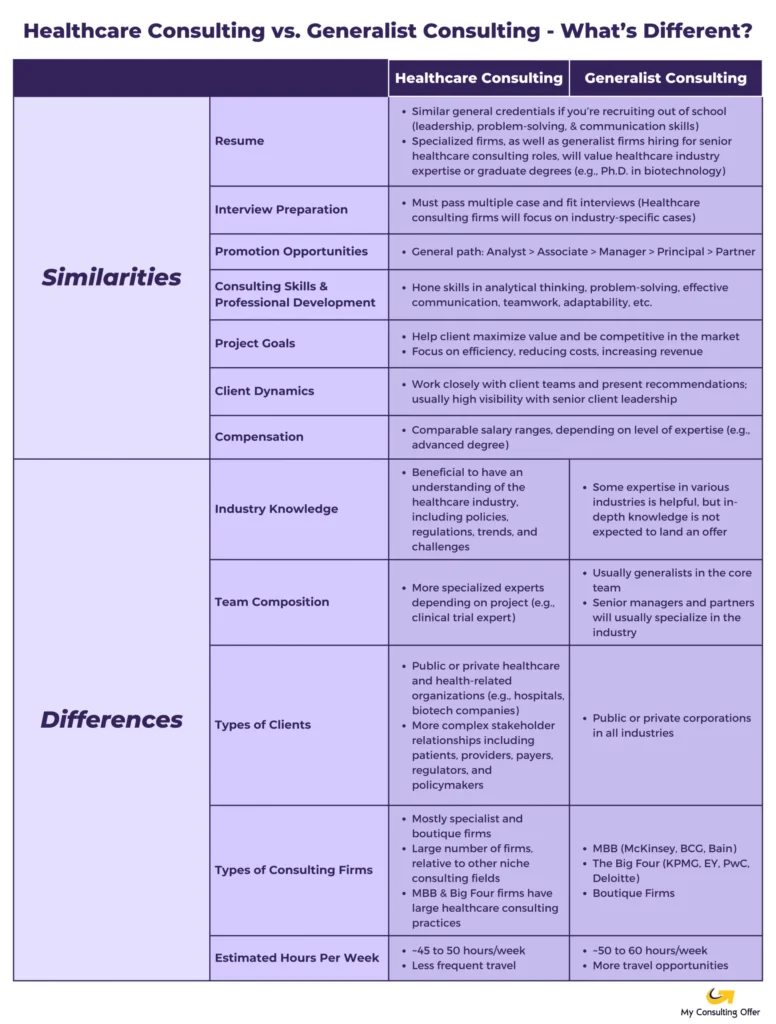
Emerging Trends in Healthcare Consulting
The healthcare consulting industry is undergoing a transformative shift as innovative technologies and new care delivery models redefine the landscape. To stay competitive and drive value, healthcare consultants are at the forefront of these advancements, helping organizations adopt and scale solutions that enhance efficiency, improve patient outcomes, and secure sensitive data. Below, we delve deeper into the key emerging trends.
1. Artificial Intelligence and Machine Learning
Artificial Intelligence (AI) and Machine Learning (ML) are revolutionizing healthcare consulting by offering unparalleled capabilities in data analysis, decision-making, and operational efficiency. Key applications include:
- Predictive Analytics: AI algorithms can analyze vast datasets to predict patient outcomes, identify high-risk individuals, and inform preventive care strategies. For example, predictive models can forecast hospital readmissions, enabling targeted interventions.
- Precision Medicine: AI and ML support personalized treatment plans by analyzing genetic, clinical, and lifestyle data to tailor therapies for individual patients. Consultants help healthcare organizations integrate these tools into their practice.
- Automated Decision Support: AI-powered systems assist clinicians by providing real-time recommendations, flagging potential errors, and streamlining diagnostics. This reduces workload while enhancing care quality.
- Operational Optimization: AI-driven tools help optimize resource allocation, such as staff scheduling, inventory management, and patient flow in hospitals, leading to cost savings and improved efficiency.
Healthcare consultants guide organizations in selecting, implementing, and scaling AI solutions while ensuring they align with clinical and operational goals.
2. Digital Health and Virtual Care
Digital health solutions are reshaping how healthcare is accessed and delivered, with telemedicine, remote monitoring, and mobile health applications leading the charge. Consultants play a critical role in helping organizations adapt to these technologies:
- Telemedicine and Virtual Care Models: Virtual consultations have become a cornerstone of modern healthcare, particularly in rural and underserved areas. Consultants assist in deploying telehealth platforms, ensuring seamless integration with existing systems, and training staff to maximize adoption.
- Remote Monitoring Devices: Wearable technology and IoT devices allow continuous monitoring of patients with chronic conditions. Consultants work on implementing data pipelines and analytics tools to make real-time insights actionable.
- Mobile Health Applications: Patient-facing apps improve engagement, medication adherence, and overall care experience. Consultants provide expertise in app development, usability testing, and regulatory compliance.
- Integration Challenges: One of the biggest challenges organizations face is integrating digital health tools with legacy systems. Consultants offer solutions for interoperability and data standardization to create a unified ecosystem.
3. Cybersecurity and Data Privacy
As the digitization of healthcare accelerates, protecting sensitive patient data and maintaining compliance with privacy regulations are non-negotiable priorities. Healthcare consultants are pivotal in ensuring robust cybersecurity and data governance practices.
- Data Security Measures: Consultants design and implement security frameworks to safeguard electronic health records (EHRs), medical devices, and connected systems against breaches and cyberattacks.
- HIPAA and Regulatory Compliance: Navigating regulations such as HIPAA in the U.S., GDPR in Europe, and other region-specific mandates is a complex task. Consultants provide expertise in compliance audits, risk assessments, and policy development.
- Threat Detection and Incident Response: With the rise of sophisticated cyber threats, consultants help organizations adopt advanced threat detection tools, conduct regular vulnerability assessments, and establish incident response protocols.
- Cloud Security: As healthcare organizations migrate data to cloud platforms, ensuring secure access and storage becomes critical. Consultants offer guidance on choosing secure cloud providers and implementing encryption and multi-factor authentication.
- Patient Trust: A breach of data privacy can irreparably harm patient trust. Consultants emphasize proactive measures such as real-time monitoring, employee training, and cybersecurity certifications to demonstrate commitment to data protection.
Why These Trends Matter
The integration of AI, digital health, and robust cybersecurity measures is no longer optional—it’s essential for organizations aiming to remain competitive in the rapidly evolving healthcare landscape. These technologies not only improve patient outcomes and operational efficiency but also help organizations meet increasing consumer expectations for seamless, secure, and personalized care.
Healthcare consultants are uniquely positioned to navigate these changes, providing the expertise needed to adopt cutting-edge solutions, overcome implementation challenges, and ensure long-term success. As these trends continue to grow, the demand for skilled healthcare consultants will only increase, making their role pivotal in shaping the future of healthcare.
Healthcare Consulting for Special Populations
Healthcare consulting plays a critical role in addressing the unique challenges faced by diverse and underserved populations. By tailoring strategies to meet the specific needs of these groups, consultants contribute to reducing health disparities, promoting equity, and improving outcomes. Below, we explore these areas in greater detail.
Addressing Health Disparities
Health disparities are systemic differences in health outcomes across various demographic groups, often influenced by socioeconomic factors, geography, and access to care. Healthcare consultants take a multi-pronged approach to address these challenges:
- Improving Access to Care: Consultants design programs to expand healthcare services in underserved areas, including rural and low-income urban communities. This may involve establishing mobile clinics, telehealth services, or partnerships with community organizations.
- Addressing Social Determinants of Health (SDOH): Social factors such as housing, education, and employment significantly impact health outcomes. Consultants help organizations integrate SDOH data into care strategies and develop partnerships with social service providers to address these needs.
- Community Engagement: Building trust within marginalized communities is essential. Consultants facilitate outreach programs, culturally competent care models, and partnerships with local leaders to encourage participation in healthcare initiatives.
Serving Veterans, Seniors, and LGBTQ+ Communities
Special populations often face unique healthcare challenges that require customized approaches. Healthcare consultants help organizations create inclusive care models and policies to meet these needs:
- Veterans: Consultants design care models that address the specific mental health and physical needs of veterans, including post-traumatic stress disorder (PTSD), traumatic brain injuries, and chronic pain. They work with Veterans Affairs (VA) systems to optimize care delivery and improve access to specialized services.
- Seniors: Aging populations often require long-term care, chronic disease management, and end-of-life care planning. Consultants help providers develop geriatric care programs, improve coordination among caregivers, and implement age-friendly healthcare facilities.
- LGBTQ+ Communities: LGBTQ+ individuals often face discrimination and unique health risks, including higher rates of mental health issues and specific medical needs such as hormone therapy. Consultants ensure healthcare systems provide inclusive, affirming care by developing policies, training staff, and creating safe spaces for care delivery.
Tailored Strategies for Refugee and Immigrant Health
Refugees and immigrants face significant healthcare challenges, including language barriers, cultural differences, and limited access to services. Consultants address these issues through:
- Culturally Competent Care Models: Consultants develop care approaches that respect cultural norms, religious practices, and traditional health beliefs. This includes recruiting bilingual staff and providing cultural competency training for healthcare teams.
- Navigation Services: Navigating complex healthcare systems can be overwhelming for refugees and immigrants. Consultants help organizations establish patient navigation programs to assist with scheduling, transportation, and understanding treatment plans.
- Trauma-Informed Care: Refugees often experience significant trauma. Consultants guide organizations in implementing mental health programs and trauma-informed care practices to address these sensitive needs.
Population Health and Public Health Strategies
Healthcare consultants also play a critical role in advancing public health initiatives and managing population health by leveraging data and designing targeted interventions.
Promoting Health Equity
Health equity ensures everyone has access to the resources they need to achieve optimal health. Consultants work to remove systemic barriers by:
- Advocating for Policy Changes: Consultants support healthcare organizations and policymakers in developing and implementing policies that prioritize equity, such as expanding Medicaid, creating affordable care programs, and addressing bias in care delivery.
- Designing Inclusive Programs: Consultants tailor health promotion campaigns and preventive care programs to meet the needs of diverse populations, ensuring no one is left behind.
Chronic Disease Management
Chronic diseases such as diabetes, heart disease, and cancer are leading causes of morbidity and mortality. Consultants address these through:
- Coordinated Care Models: Consultants design integrated care models that connect primary care providers, specialists, and community resources to ensure seamless management of chronic conditions.
- Lifestyle Intervention Programs: To address risk factors like poor nutrition and physical inactivity, consultants develop community-based wellness initiatives, including fitness programs, healthy eating campaigns, and smoking cessation support.
- Preventive Screenings: Consultants encourage early detection by helping organizations implement accessible screening programs and education campaigns.
Leveraging Data for Population Health Analytics
Data analytics is the backbone of effective population health management. Consultants help organizations harness the power of data to improve care:
- Trend Identification: By analyzing data from electronic health records (EHRs), claims, and community surveys, consultants identify health trends, such as rising rates of chronic disease or vaccine hesitancy.
- Risk Stratification: Consultants use analytics to categorize populations based on risk levels, enabling targeted interventions for high-risk individuals.
- Measuring Outcomes: Consultants design dashboards and reporting tools that track the impact of public health initiatives and identify areas for improvement.
Expanding the Role of Healthcare Consultants for Special Populations
The evolving healthcare landscape demands innovative and inclusive strategies to address the unique challenges faced by special populations. Consultants are stepping up to bridge gaps in care, advocate for health equity, and leverage data-driven solutions. From designing inclusive care models to addressing chronic disease and promoting public health, healthcare consulting continues to be a catalyst for positive change in communities around the globe.
By tailoring their expertise to meet the specific needs of diverse groups, healthcare consultants not only improve individual outcomes but also drive systemic change that benefits society as a whole.
Current Trends and Innovations in Healthcare Consulting
The healthcare industry is in a state of rapid evolution, driven by technological advancements, shifting consumer expectations, and global challenges. Healthcare consultants are at the forefront of these changes, helping organizations adapt, innovate, and thrive in a competitive landscape. Below are some of the most significant trends and innovations shaping healthcare consulting today.
Consumer-Driven Healthcare Models
As healthcare becomes more consumer-focused, organizations must prioritize patient experience, transparency, and personalization to meet rising expectations. Healthcare consultants play a critical role in facilitating this shift by:
- Enhancing Patient Engagement: Consultants help organizations develop patient-centric strategies, such as digital portals and personalized communication, to foster engagement and improve satisfaction.
- Improving Transparency: Consultants guide providers in implementing clear pricing structures and simplifying billing processes to build trust with patients.
- Personalizing Care: Leveraging data analytics, consultants help organizations deliver tailored care plans that address individual health needs and preferences.
- Navigating New Business Models: Consumer-driven healthcare includes innovative approaches like direct-to-consumer telemedicine and subscription-based health services. Consultants assist in designing and scaling these models.
Environmental Sustainability and Climate-Resilient Healthcare
Sustainability is becoming a top priority for healthcare organizations worldwide, as they seek to reduce their environmental impact while preparing for the effects of climate change. Healthcare consultants contribute by:
- Implementing Green Initiatives: Consultants help organizations adopt energy-efficient technologies, reduce waste, and transition to renewable energy sources.
- Designing Climate-Resilient Systems: Climate change poses risks such as extreme weather events and disease outbreaks. Consultants develop plans for disaster preparedness, infrastructure resilience, and resource optimization.
- Promoting Sustainable Practices: From supply chain management to sustainable construction, consultants integrate environmentally friendly practices into all aspects of healthcare operations.
- Addressing Regulatory Requirements: Consultants ensure compliance with environmental regulations and help organizations achieve certifications like LEED (Leadership in Energy and Environmental Design).
Advanced Applications of Artificial Intelligence
Artificial Intelligence (AI) is transforming healthcare consulting by enabling organizations to achieve operational efficiency, enhance clinical outcomes, and drive innovation. Consultants are instrumental in harnessing AI’s potential through:
- Predictive Diagnostics: AI tools analyze patient data to identify risks early, enabling proactive intervention and better outcomes. Consultants guide the adoption of these technologies to integrate seamlessly with clinical workflows.
- Operational Optimization: AI is used to streamline administrative tasks such as appointment scheduling, resource allocation, and supply chain management. Consultants ensure these solutions deliver measurable benefits.
- Personalized Medicine: By analyzing genetic and clinical data, AI facilitates customized treatments tailored to individual patients. Consultants help healthcare providers adopt precision medicine approaches.
- AI Ethics and Governance: As AI adoption grows, consultants address concerns related to bias, data privacy, and ethical use, ensuring compliance with industry standards.
The Path to Becoming a Healthcare Consultant
A career in healthcare consulting requires a strong foundation in healthcare systems, business management, and specialized skills. Here’s how aspiring consultants can prepare for and advance in this dynamic field.
Educational and Professional Requirements
- Relevant Degrees: A bachelor’s degree in healthcare administration, business, or a related field is the minimum requirement. Advanced degrees like an MBA (Master of Business Administration), MPH (Master of Public Health), or MHA (Master of Healthcare Administration) provide a competitive edge.
- Industry Knowledge: A solid understanding of healthcare systems, regulations, and patient care models is essential to excel in this role.
Certification and Training Opportunities
- Specialized Certifications: Credentials such as Certified Healthcare Consultant (CHC), Lean Six Sigma, or Project Management Professional (PMP) validate expertise in healthcare consulting and process improvement.
- Continuous Learning: Staying current with industry trends, emerging technologies, and regulatory changes is critical. Many consultants pursue workshops, webinars, and additional certifications to expand their skill set.
Career Path and Industry Insights
- Entry-Level Roles: Many healthcare consultants begin as healthcare analysts, project coordinators, or junior consultants, gaining hands-on experience in the field.
- Advancement Opportunities: With experience, professionals can move into senior consulting roles, specializing in areas like strategy, technology, or operations.
- Networking and Mentorship: Building professional connections and seeking mentorship from industry leaders are key strategies for career growth.
- Entrepreneurial Opportunities: Experienced consultants often establish their own firms, providing niche expertise to healthcare organizations.
Conclusion
Healthcare consulting is a dynamic and rewarding field that offers opportunities to shape the future of healthcare delivery. By staying abreast of emerging trends such as consumer-driven models, sustainability, and AI, consultants can drive meaningful change for their clients and communities. Aspiring consultants should focus on education, certification, and continuous learning to build a successful career in this transformative industry.
The Future of Healthcare Consulting
Anticipating Regulatory and Policy Changes
Consultants must stay ahead of policy changes, such as shifts in value-based care or updates to data privacy regulations, to help clients remain compliant.
The Role of Innovation and Emerging Technologies
Emerging technologies like blockchain, machine learning, and virtual reality are poised to transform healthcare consulting. Consultants who leverage these innovations will drive the industry’s future.
The Growing Focus on Patient-Centered Care
Patient-centered care remains a top priority. Consultants design strategies that prioritize patient satisfaction, engagement, and outcomes in every aspect of care delivery.
Conclusion
Healthcare consulting is a dynamic and impactful field that empowers organizations to achieve operational excellence, adapt to industry trends, and deliver superior patient care. By leveraging expertise in strategy, technology, and quality improvement, healthcare consultants drive sustainable growth and innovation. As the industry evolves, healthcare consulting will continue to play a vital role in shaping the future of healthcare.
This comprehensive guide equips healthcare leaders and aspiring consultants with the knowledge to navigate this transformative industry effectively.
